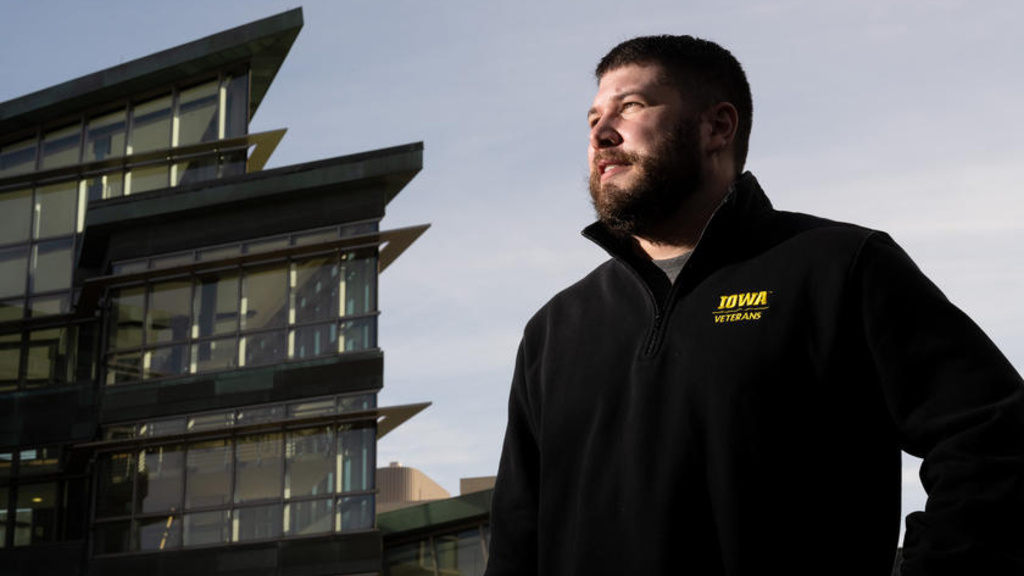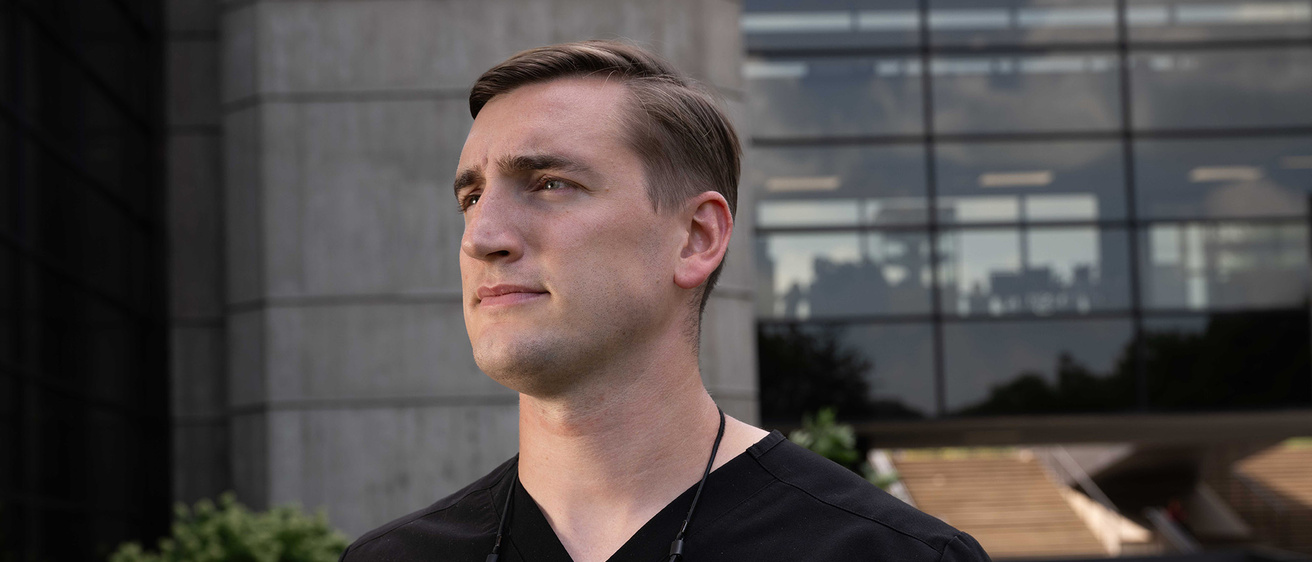Zach Graham feels an obligation to serve others. That helps explain why Graham, a third-year student in dental surgery in the University of Iowa College of Dentistry and an Army Veteran, has been named a 2023 Pat Tillman scholar.
Story: Richard C. Lewis
Photography: Tim Schoon
Published: Oct. 2, 2023
Zach Graham is committed to service above self. An Army Veteran and third-year graduate student in the University of Iowa College of Dentistry, the Cedar Falls, Iowa, native has helped others in numerous roles: advocacy chair, legislative liaison, academic counselor.
That dedication to others explains in large part why Graham has been named a 2023 Pat Tillman Scholar. The honor is exclusive: Graham is one of only 60 United States service members, Veterans, and military spouses chosen nationwide this year for the award.
“I truly feel honored to be selected,” says Graham, the lone Iowa native attending an Iowa institution in this year’s Tillman Scholar class. “Looking at the values associated with the Pat Tillman Scholarship and with Tillman himself, I want to live my life by those values. He’s an inspiration to me; I feel an obligation to make an impact.”
Graham had designs on making the military his career, saying its values—honor, service, leadership, and teamwork—matched his. After graduating from Iowa State University in 2014 with a double major in anthropology and international studies and a minor in military science, Graham commissioned as an all-source intelligence officer in the Army, stationed in Germany as the lead intelligence officer for the Army’s aviation unit in Europe, focused on countering Russian air defense systems. Graham entered with the rank of second lieutenant and left as a captain.
“I commissioned the year that Russia initially invaded Ukraine (Crimea), so much of our focus was on the strategic defense of Europe if Russia continued their attack,” Graham says. “Very pertinent now!”

Zach Graham (standing, far right) poses for a photo with the team from the 12th Combat Aviation Brigade that he led on a four-day, 100-mile march across the Netherlands in 2016.
But his father’s unexpected death in an accident, just two weeks after Graham married his wife, Mackensie, caused him to reassess his goals.
“After my dad died, that led to a lot of introspection,” Graham says. “I saw people in my job 10 years down the line, and I wasn’t seeing whether I would make the positive impact I wanted to do.”
A chance lunch encounter with an Army buddy led Graham to consider dentistry as his next move. Mark Lamborn, an on-base dentist, offered Graham the opportunity to shadow him while he extracted some molars.
“I thought, ‘OK, sure, I’ll come out and watch,’ almost as a favor,” Graham recalls, holding a preconceived notion that dentistry was boring.
A week later, he watched his friend in action. “And it was like, boom, in 30 seconds, I knew this is exactly what I wanted to do,” Graham says. “You are literally having a direct impact with your hands. There is zero degree of separation between you and changing someone’s life, which is incredibly special.”
Graham’s commander permitted him to shadow Lamborn weekly, where Graham witnessed the full slate of what dentists do. “I got to really find out if that’s what I wanted,” Graham says. “And every step along the way, that was a resounding yes.”
In August 2021, Graham matriculated into the UI College of Dentistry. He chose Iowa for several reasons: the College of Dentistry was one of a few in the nation that at the time offered every dental specialty; there were opportunities for Graham to do research; and his wife was a student in the College of Law.
“You are literally having a direct impact with your hands. There is zero degree of separation between you and changing someone’s life, which is incredibly special.”
He has wasted no time getting heavily involved. Since March, Graham has been advocacy chair for District 8 of the American Student Dental Association, working to improve relations between student dental associations at six dental schools in the Midwest and their respective state-level dental associations.
“I’m working with dental students from across these schools to lobby for policies and legislation that positively impact dentistry and our patients’ access to care and build lasting relationships with their local dental associations,” Graham says.
He also was legislative liaison in the Iowa American Student Dental Association, representing Iowa dental student interests at the state and national levels. That included lobbying national policymakers in Washington, D.C., on issues relating to dentistry, patient access to care, student loans, and the Ensuring Lasting Smiles Act, which would require insurance companies to cover medically necessary surgeries for people with craniofacial anomalies, such as cleft lip and cleft palate.
Graham earned the District 8 and 9 Legislative Liaison of the Year award for outstanding success in organizing dental advocacy for his participation in the first joint Iowa Dental Lobby Day between the College of Dentistry and the Iowa Dental Association.
More recently, Graham was appointed to the American Dental Association Strategic Forecasting Committee Public/Professional Action Group, which deals with the strategic initiatives that improve the oral health of the public and advance the profession of dentistry.
“I am very honored to be one of the voices that will work toward this goal,” says Graham, whose appointment was made by ADA President George Shepley and the strategic forecasting committee’s chairperson.
Graham has been an academic counselor for Veterans on campus, establishing the Math Platoon, in which student Veterans get personalized tutoring from their service member peers.
Graham’s research investigates why some patients don’t complete root canals. One theory is that patients may think they have been fully treated after the first visit, when the originating pain has been relieved. Another theory is that a complete root canal regimen requires multiple visits, and some people don’t want to commit. Graham is poring over about 2,000 patient charts to get answers. Moreover, the database he’s building through the patient records can be used for future studies.
“Zach’s research may assist clinicians in identifying clinical situations where the risk of incomplete root canal treatment is higher, providing the opportunity for appropriate management,” says Christopher Hogden, assistant professor of endodontics in the College of Dentistry and Graham’s advisor on the research. “In theory, this would allow more patients to maintain their teeth for a longer duration, ideally throughout life.”
After his expected graduation in June 2025, Graham hopes to enter a specialty program in endodontics, with Iowa as one of his targets. He says endodontics, the branch of dentistry concerned with diseases and injuries of the soft tissues inside a tooth, appeals to him in general because it is a crossroads of medicine and art.

Iowa’s first Tillman Scholar
Zach Graham follows in the footsteps of 2021 Tillman Scholar Jacob Schillo, a U.S. Air Force Veteran and current graduate student in the Department of Anatomy and Cell Biology in the University of Iowa Carver College of Medicine.
The medical facet is about helping people through surgical procedures that restore or enhance patients’ quality of life.
“Nothing is better than Mother Nature for what’s in your mouth,” Graham explains. “So, as an endodontist, if I can save that tooth from needing to be pulled out, I can maintain their ability to speak, their ability to interact, their self-esteem, and to live a life without further dental complications.”
The art is about the precision and craftsmanship with not only restoring a tooth’s function, but in matching the oral aesthetics unique to each individual’s set of teeth.
“You are really creating a sculpture in someone’s mouth,” Graham says.
Graham learned about the Pat Tillman Foundation and its support of Veterans while in the Army and researching dental schools. When he learned he won the award, he received congratulatory notes from many, including Teresa Marshall, professor of preventive and community dentistry and director of the student research program in the College of Dentistry.
“The honor is so well deserved,” Marshall wrote to Graham. “You are a scholar who represents their military peers in the best of light. You’re also a great advocate for your military peers who have struggled in their return to civilian life. While it’s an honor for you to receive this award, ‘we’ are honored to have you at the college to remind us of the sacrifices our military men and women make daily for us.”
Graham says the money associated with the award means the least.
“Really, it’s about the network of like-minded peers who are driven by their values and what they believe in,” he says. “It’s not an award for what you have done, it’s an investment into what you can do in the future.”
